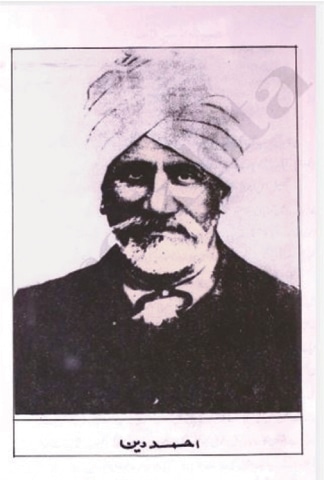
STRANGE are the ways of destiny. Sometimes writers become celebrities without much toil and moil, but there are others for whom stars shine brightly for a while and then they are lost out to the darkness of anonymity despite their hard work.
More strange seems the fate of writers whose books are popular, but who are forgotten quickly when they die and soon become unknown in the new literary environment. This is exactly what happened to Ahmed Deen (1866-1929). Though he is almost completely unknown to the new generation of critics and researchers of Urdu, some of his books were, and still are, very popular. For instance his Sarguzasht-i-Alfaaz, which has been published several times over, was rated by Mushfiq Khwaja as “one of the most read books of Urdu”. Ahmed Deen’s other book Iqbal, which created a sort of controversy, too, has run into several editions and is one of the earliest works ever written on Allama Iqbal’s poetry. But rarely is Ahmed Deen’s name mentioned, if ever, in critical work of Urdu literature and hardly any of his biographical details are given in any book.
It was Mushfiq Khwaja who first penned a detailed research article on Ahmed Deen in 1967, which was published in Iqbal Review. Later on when Khwaja sahib edited Ahmed Deen’s book Iqbal, he updated the article and included it in the book as foreword. Before Ahmed Deen’s book Iqbal, on Iqbal’s poetry only a few articles and A Voice From the East — a book in English by Sir Zulfiqar Ali Khan — had been published. Zulfiqar Ali Khan’s book, a slim volume of about 50 pages, was first published in 1922. It has been reprinted by Iqbal Academy, Lahore.
So Ahmed Deen’s book Iqbal was the first book ever written in Urdu on Allama Iqbal and his poetry. But fate played a strange game with Ahmed Deen: the book was ‘printed’ in 1923, but could not be ‘published’ as Iqbal had raised objection to its publication. Till then, no collection of Iqbal’s Urdu poetry had appeared and Iqbal had been collecting and editing his Urdu poetry with a view to publish it. But Iqbal was very choosy about his own poetry and was in favour of publishing only selected verses, discarding many of them as he thought they were not quite up to the mark. But Ahmed Deen’s book included many of the verses that Iqbal wanted to either discard or alter.
Those verses were originally published in Makhzan, some other periodicals or the reports of Anjuman Himayat-i-Islam. But on Iqbal’s displeasure on the inclusion of certain verses, Ahmed Deen, being a close friend of Iqbal’s, withdrew all the copies and burnt them. When Iqbal knew about the burning of the book, he expressed his deep regrets.
When Baang-i-Dara, Allama Iqbal’s first collection of Urdu poetry, appeared in 1924 Ahmed Deen began writing his book Iqbal all over again and published it in 1926. It was much different from the first edition. But two copies of the first edition had survived by chance. They also included some rare verses of Iqbal which Iqbal had discarded and the verses remained largely obscure ever after. So Mushfiq Khwaja prepared a new edition based on the texts of both the editions. This new and edited version of Iqbal by Ahmed Deen was published by Anjuman Taraqqi-i-Urdu Pakistan in 1979. Iqbal Academy, Lahore, published a new edition in 2006. The rare verses of Iqbal then were included in some of the collected works on Iqbal’s discarded Urdu poetry, such as Sabir Kalorvi’s book Kulliyat-i-Baqiyat-i-Shear-i-Iqbal.
Sarguzasht-i-Alfaaz by Ahmed Deen is one of the early works on the origin and etymology of Urdu, Persian and Arabic words. Though based on Archbishop Richard Chenevix Trench’s book On the Study of Words, Ahmed Deen’s book is not a translation and discusses many words not part of the original English work. It describes, in an interesting style, the origin of certain words, idioms and phrases used in Urdu. It was first published in 1923 and was dedicated to Muhammad Hussain Azad, one of the teachers of Ahmed Deen at Lahore’s Government College (now a university), who had kindled a love of learning and words in Ahmed Deen.
According to Mushfiq Khwaja, Ahmed Deen was born in Lahore in 1866. He was of Kashmiri descent and had a surname ‘Lone’. His early schooling took place in Gujranwala where his father, a medical doctor by profession, was posted. When his father was transferred to Lahore as a prison doctor, Ahmed Deen was admitted to Lahore’s Central Model School. He did his graduation from Lahore’s Government College and joined Lahore’s Paisa Akhbar, one of the most successful newspapers in those days. Later on he studied law and Sir Abdul Qadir, the editor of Makhzan, a literary magazine to which Ahmed Deen used to contribute, in an editorial note described him as a “well-known lawyer”. Ahmed Deen also served Anjuman Himayat-i-Islam and Anjuman Kashmiri Musalmanaan in different capacities. Ahmed Deen penned some 20 books.
He died in Lahore on Oct 9, 1929.
Published in Dawn, October 8th, 2019















































Dear visitor, the comments section is undergoing an overhaul and will return soon.